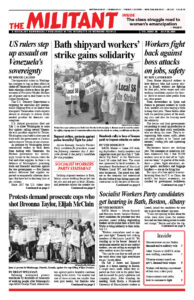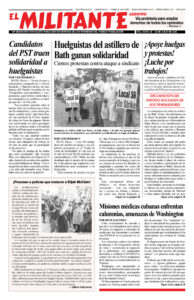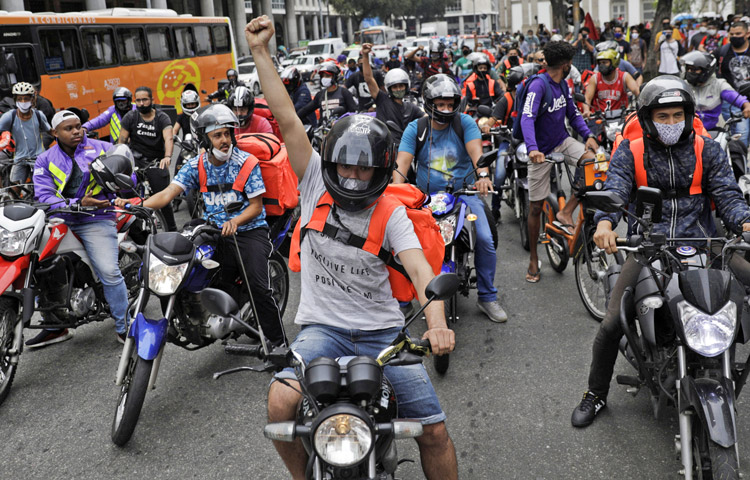From Maine shipyard strikers to food delivery bike and scooter drivers in Brazil, workers are fighting for their jobs, better wages and safer working conditions against the bosses’ drive to extract more profits from our labor power.
From autoworkers in Spain and France to garment workers in South Asia, workers are also waging a fight to keep their jobs. These battles show both the potential power of the working class and also the burning need for solidarity.
The bosses and their governments are pushing to crank up production to compete with their rivals worldwide, who are doing the same. They’re reorganizing their mines, mills, plants and retail outlets to be “leaner and meaner,” cutting jobs and squeezing workers.
Big-business bosses are slashing jobs. Top managers at American Airlines announced July 2 that 20,000 workers have to be laid off to “right-size our team.” A quarter of the workforce — pilots, flight attendants, airport agents, mechanics and baggage handlers — are on the firing line.
But signs of a June uptick in manufacturing from the U.S. to China, the world’s two largest economies, are clouded by government lockdowns justified by coronavirus outbreaks in many countries. Governments at the federal, state and local levels in the U.S., as well as abroad, are looking to scale back special unemployment benefits or wage subsidy schemes adopted earlier. The sharpest contraction in world production and trade since the 1930s continues to unfold.
Everything the bosses do is calculated to wring more profits from the labor of working people in both cities and the countryside through wage and debt slavery.
Government debt crises and corporate bankruptcies are spreading, with dire consequences for workers. Brooks Brothers announced July 8 it was throwing in the towel. Bosses in June had previously told workers at its three garment factories that their jobs were in jeopardy.
The 200-year-old clothier joins a growing number of other retail outlets large and small going out of business — from J.C. Penney to J. Crew and Neiman Marcus, along with an untold number of groceries, restaurants and other small businesses.
The number of people in the U.S. getting unemployment benefits is still at 19 million. This doesn’t count millions who still don’t qualify or can’t get through. In Colorado alone, 40,000 phone calls a week by jobless people desperate to claim benefits go unanswered.
Government agencies have cut 1.5 million jobs since March. Georgia slashed school funding by $950 million, which will hit hardest in rural areas.
Dayton, Ohio, cut 8% of its general fund, which pays for the fire department, roads, water and trash collection. Mayor Nan Whaley said layoffs are likely. In Washington, D.C., funding for drug treatment programs got the ax.
The capitalist rulers in Australia imposed a new, harsher six-week lockdown in Melbourne July 7, as cases of coronavirus resurfaced. Hundreds of police forced 3,000 people, mainly from East African immigrant families, to stay in a “hard lockdown” in nine apartment towers across the city, with no chance to get out and stock up on supplies. A sign in one window, demanding an end to the imprisonment, said, “Treat us as humans, not caged animals!!”
Worldwide workers’ resistance
The strike by over 4,300 machinists at the Bath Iron Works shipyard in Maine, where bosses are pushing to replace more and more union members with contract workers, is an important battle for U.S. labor (see article on front page).
Workers’ resistance to the depredations of capital continues to stir worldwide. In Brazil, over 1,000 food delivery drivers on motorcycles gathered in the largest city, Sao Paulo, July 1, to protest the working conditions imposed by Uber and other bosses. Many drivers also joined protests in other cities, fighting for better pay and health protections.
Faced with government quarantines, demand for home food deliveries is up 30%. With half the country’s workers unemployed, many have turned to “app employers” like Uber, Brazil’s iFood or Colombia’s Rappi to try to make a living. The companies are using the increased competition to drive down pay, claiming their drivers aren’t workers, just “freelancers.”
In Harare, Zimbabwe, police arrested a dozen nurses from among those demonstrating outside several state hospitals July 6. Holding placards saying, “No U.S. dollar, no work,” they were demanding that salaries be paid in U.S. dollars. Runaway inflation is ravaging the real value of the country’s currency, currently at almost 800%.
Workers at Tata Steel’s main mill in the Netherlands ended a three-week strike for job security July 3 after bosses agreed to drop threatened compulsory layoffs. The Indian-headquartered bosses had plans to scrap around 1,000 of the 9,000 jobs as part of a reorganization of their Dutch operations. They’re still looking to downsize.
In Israel, social workers launched a nationwide strike July 6, demanding pay raises and improved working conditions. Some 2,000 people employed by government and municipal authorities also protested in Tel Aviv that day. They are calling for an increase in staffing levels as joblessness, depression and drug use are growing.
Thousands of autoworkers since May have been on strike at Nissan plants in Barcelona, Spain, over company plans to close them, throwing 25,000 workers out on the street. They’ve constructed and staff 24/7 a protest encampment at the gates, dubbed “La Resistance,” to prevent the bosses from trying to move out machinery and supplies. Workers’ overalls have been hung on the fence with the message, “Our virus is the closure.”
These working-class struggles over jobs, wages and working conditions — from shop-floor skirmishes to strike battles — are essential for workers to chart a course to unite the employed and unemployed, win allies and advance our class interests.
Working-class political action
The 2020 U.S. presidential election is reaching new levels of political polarization. The July 2 New York Times headlined an opinion piece by Paul Krugman, “Trump’s Virus Is Spreading, and His Economy Is Stalling.” The strategy being advanced by Democratic Party leaders — and their backers in the liberal editorial offices of papers like the Times — is to try and prolong government virus-justified lockdowns and the growing number of travel bans, with the job shutdowns they provoke, hoping to pin the blame for both the disease and the economic crisis on the president.
The fact that millions of working people will lose their jobs because of this strategy is of no concern to them.
Another part of their plan is to keep Democratic nominee Joe Biden sequestered in his basement, where he can do little damage. Leading Times columnist Thomas Friedman urged Biden July 7 to refuse to come out and take part in pre-election debates with Trump.
The Socialist Workers Party is getting a broader hearing today for their presidential ticket of Alyson Kennedy and Malcolm Jarrett. The SWP is campaigning for workers to organize their own political party, a labor party.
In the face of widespread unemployment, a labor party would organize workers in their millions to fight for a massive government-funded public works program. This would provide jobs at union-scale wages to build things workers need — hospitals, housing, child care centers, schools, and to replace crumbling infrastructure.


